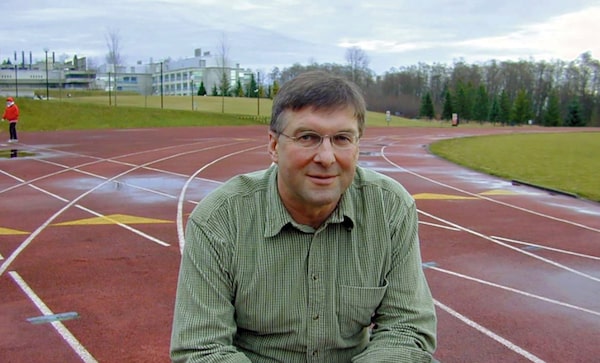
Wilf Wedmann on the Simon Fraser University track that he helped develop.SFU Archives
To pursue their dream of a life in the West, Wilf Wedmann’s parents embarked on a daring plan to escape from the newly formed East Germany in 1949.
According to family lore, his father crossed into West Germany via one route. About a week later, his mother managed to spirit 18-month-old Wilf by another. Initially, the husband and wife each doubted the other had made it to freedom, but they managed to reunite and immigrate to Canada.
Growing up in working-class East Vancouver, Wilf Wedmann chased his own dream, competing in high jump at the 1968 Olympics when he was 20. Later, Mr. Wedmann, who died Nov. 12 of a heart attack at age 73 in a care facility in Surrey, B.C., helped hundreds of Canadian athletes pursue their dreams while serving as a coach and leader of large sports organizations – including what is known today as Athletics Canada during the era of the Ben Johnson doping scandal.
Wilfredt Adolf August Wedmann was born April 17, 1948, in Wagenitz, then part of East Germany. He was the only child of Artur Gerhardt Wedmann and Erna (née Janot) Wedmann, who were both born in Poland and fled the Nazi-occupied country during the Second World War. A farmer’s son, Artur Wedmann had hoped to become an academic, but his university studies were interrupted by the war. He had a long career as a Vancouver lumber mill worker, also serving as a union leader. Erna Wedmann was a homemaker.
Wilf inherited his father’s intellectual ambitions, excelling as a student and athlete at Simon Fraser University (SFU). During the 1968 Olympics in Mexico City, he saw Tommie Smith and John Carlos raise gloved hands in Black Power salutes as the African-American athletes stood on the medal podium.
“I was a jock up until then but those Games radicalized me,” Mr. Wedmann told an interviewer from SFU. “Suddenly, I was conscious of the broader social issues of sport.”
Mr. Wedmann continued to compete internationally after the Olympics. He ventured to Tokyo for the 1969 Pacific Conference Games and won a silver medal at the 1971 Pan American Games in Cali, Colombia.
In 1972, Mr. Wedmann became SFU’s first Rhodes scholar and then, after two years at Oxford, took postgraduate history courses and obtained a teaching certificate from the University of British Columbia (UBC) – but chose to work outside the classroom.
“My university training was directed toward an academic career,” he wrote on his résumé. “By accident, I became involved in organizing sport-related activities and realized I was more interested in application than pure research.”
In 1979, Mr. Wedmann co-founded the B.C. Premier’s Sports Awards program with three-time Olympic legend Harry Jerome.
“They worked the same way, they admired each other, and they were extremely close,” Mr. Jerome’s sister Valerie said. “It was a beautiful relationship for both of them.”
The program helped intermediate-grade schoolchildren – including physically challenged youngsters – get involved in various sports. The ex-Olympians’ ability to gain provincial funding for it was considered a coup.
“[Mr. Wedmann] brought [to track and field] an intellect and a level of political awareness – he and Harry,” said Dr. Doug Clement, a long-time track and field event organizer and former Canadian national team doctor and coach. “Now, we’re able to work within the government confines and learn how to manage the politics of federal and provincial sports sponsoring groups.”
Mr. Wedmann and Mr. Jerome spent three years developing the program and tested it in the First Nations community of Kitwanga, B.C. and the Vancouver elementary school where Ms. Jerome was teaching. But a week before the official launch in 1982, Mr. Jerome died of a brain aneurysm at the age of 42.
“It was my coach [and Mr. Jerome’s mentor], John Minichiello, and Wilf Wedmann who managed to drag me and keep me alive throughout that process of organizing a memorial service and cleaning out Harry’s desk down at his office,” said Ms. Jerome, a 1960 Olympic sprinter and long jumper.

Wilf Wedmann became Simon Fraser University's first Olympian as he qualified for the 1968 Mexico City Olympics in the high jump.SFU Archives
“Wilf took care of all of that. He was extraordinarily helpful. His first marriage was dissolving at that time, and he really threw himself into supporting me and my son throughout that process.”
Between 1977 and 1985, Mr. Wedmann worked as a coach and administrator. He coached UBC high jumpers informally, including Jeannie Cockroft, who won three Canadian university titles along with the Canada Games and multiple national senior-level crowns, and Carmyn James, who followed Mr. Wedmann’s example, becoming a coach at the Canadian university and national-team and U.S. college levels before accepting her current post as technical director for Athletics Alberta.
“He was definitely the guiding light as far as finding a career path and stuff goes,” Ms. James said.
In 1985, Mr. Wedmann took the helm of the Canadian Track and Field Association (CTFA), now known as Athletics Canada, which throughout his tenure was rocked by allegations of steroid use by Mr. Johnson and other athletes.
Mr. Wedmann declined requests to launch an investigation – or arrange for Mr. Johnson to be tested out of competition – because accusers were unwilling to be identified and put their claims in writing. He was wary that Mr. Johnson’s coach, Charlie Francis, would follow through on threats to launch legal action after both had publicly denied being involved with steroids.
Mr. Wedmann’s refusal to respond to the doping allegations came under scrutiny at the 1989 Dubin Inquiry, which uncovered years of widespread steroid use among Canadian athletes, including Mr. Johnson, who had been stripped of his 1988 Seoul Olympics gold medal in the 100-metre after testing positive for steroids. During the inquiry, Mr. Johnson admitted to drug use, while Mr. Francis confessed to orchestrating a drug regimen for the shamed sprinter and other athletes.
In his report, Justice Charles Dubin said that Mr. Wedmann could have found proof if he had launched an investigation, while the CTFA failed to enforce its anti-doping policy and unnecessarily delayed implementing a random drug-testing program under development. But Justice Dubin concluded that Mr. Wedmann did not deliberately cover up athletes’ drug use.
Brian McCalder, CEO of BC Athletics, said Mr. Wedmann wanted to create “bullet-proof” drug-test protocols and his efforts set the stage for current testing methods.
“Some people would call [Mr. Wedmann’s tough stance] stonewalling, but I don’t think he was alone,” said Dr. Clement, who resigned from the CTFA’s medical team in 1984 over his concerns about suspected athlete drug use.
Mr. Wedmann, he added, was caught in the “dilemma” that all sports governing bodies face when government funding hinges on medal victories, but the Dubin Inquiry findings do not detract from his career.
“He was just a victim of the circumstances and succeeded in making some very positive contributions,” Dr. Clement said.
Mr. Wedmann went on to run the Canadian Sport and Fitness Administration Centre, overseeing the housing and servicing of 76 national sport and active-living organizations, and then became president and CEO of Gymnastics Canada.
Gymnast Kyle Shewfelt, who received a gold medal in the men’s floor exercise competition at the 2004 Olympics – Canada’s first medal in artistic gymnastics – said Mr. Wedmann made others around him better, and that Mr. Wedmann’s legacy with Gymnastics Canada can be found in the success that Canadian gymnasts enjoy today.
“He set such a wonderful leadership example,” Mr. Shewfelt said. “He built a strong foundation that the sport just continues to build up.”
Mr. Wedmann spent the final seven years of his career as athletic director at SFU, where he spearheaded the development of several facilities, including a new track.
“He was definitely a force,” said Brit Townsend, SFU’s head athletics coach. “When he put his mind to getting something done, he got it done.”
Brenda Kent, who was married to Mr. Wedmann briefly in the 2000s, said he viewed his work at SFU and the couple’s two children as his top achievements.
“He always loved kids, but he never had his own until later in life,” Ms. Kent said. “They really brought him to life. It’s just heartbreaking to me that they couldn’t have had more time with him when he was well.”
Mr. Wedmann suffered from strokes and dementia during his final years. He leaves his daughter, Nova, 13, and son, Quinn, 16.